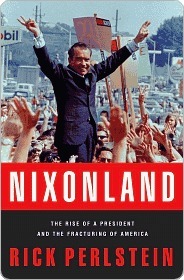More on this book
Community
Kindle Notes & Highlights
Read between
December 26, 2023 - February 26, 2024
But honesty was a dull blade to take into a knife fight with Richard Nixon—who was simply willing to lie.
They were hardly one big happy family. But what united them vindicated Attorney General Mitchell. All, after their different fashions, wished to see the existing society gone. That any two given New Leftists were more likely to break into fisticuffs than join in any effective conspiracy did nothing to dissuade the forces of law and order that they must be destroyed.
On October 13 White House couriers pulled a kid out of class at Georgetown for a photo opportunity. Randy Dicks had written to the president about his September 26 press conference, “It has been my impression that it is not unwise for the President of the United States to make note of the will of the people.” Dicks was selected from thousands of letter-writers to hear back from the president, to show that he cared. An NSC aide drafted Nixon’s response. Kissinger kept on tossing them back: “Make it more manly.” The president ended up saying, “Whatever the issue, to allow the government policy
...more
In actual fact that was how the founders, brave men, intended it. Indeed, they reveled in it. A querulous American press—far more opinionated, nasty, and partisan than anything Nixon would have to suffer—predated American government. Thomas Jefferson used to lay out the most scabrous articles about him in the White House antechamber where emissaries of foreign potentates waited to be received by him. They would stride forth, waving the pages: Mr. President, are you aware of the things they’re writing about you? Jefferson found nothing so delightful. Yes, he would reply, and they’re welcome to
...more
This was the Nixon who once shared in a moment of introspection to an aide, “It’s a piece of cake until you get to the top. You find you can’t stop playing the game the way you’ve always played it because it is part of you and you need it as much as an arm or leg…. You continue to walk on the edge of the precipice because over the years you have become fascinated by how close to the edge you can walk without losing your balance.”
Nixon had blamed Burns, and regressed in his rage to childhood: the sensitive son absorbing the anger of a hard-pressed, helpless, small-town independent grocer of particularly bitter disposition. It was meat prices driving inflation, Nixon decided, big supermarkets who refused to pass lower cattle prices on to consumers. “Kick the chain stores,” he said in early February (“kicking” was always the favorite Nixon metaphor when expressing violent moods; a psychobiographer once wondered whether Frank Nixon had kicked Richard as a child). “I think you will find that chain stores who generally
...more
Within the week, in front of the burbling fountain on Revelle Plaza at UC–San Diego, George Winnie Jr., twenty-three, held up a cardboard sign reading IN GOD’S NAME, END THIS WAR, struck a match, and went up in a burst of flame.
It is a lesson of the sixties: liberals get in the biggest political trouble—whether instituting open housing, civilian complaint review boards, or sex education programs—when they presume that a reform is an inevitable concomitant of progress. It is then that they are most likely to establish their reforms by top-down bureacratic means. A blindsiding backlash often ensues.
thirty-two-year-old poverty worker Edward T. Coll, who filed in New Hampshire even though he was too young to be inaugurated. Coll did get a spot on the podium for a televised debate. He exploited his fifteen minutes of fame by dangling a rubber rodent before the cameras and crying, “We can’t do anything in this country until we do something about the rat!”
Theorists such as Fred Dutton, in Changing Sources of Power, argued that the people who resonated to this message were America’s ascendant political coalition: newly enfranchised students, highly educated professionals, dispossessed minorities, women coming into feminist consciousness. Even the Wallace surge fit into the theory: his followers were a subspecies of the alienated American, angry because they were shut out from the Establishment. Dutton insisted that “some of the younger voters who were for Wallace in ’68 were concerned less with his racial connotations than his stance as a
...more
Nixon signed his long-in-the-making revenue-sharing bill at Independence Hall. Here was the apotheosis of the blue-collar turn to cultural populism at the expense of economic populism: the bill was Nixon’s deliberate retreat from the legacy of the New Deal and the Great Society and would likely do real damage to the balance sheets of cities like Philadelphia.


